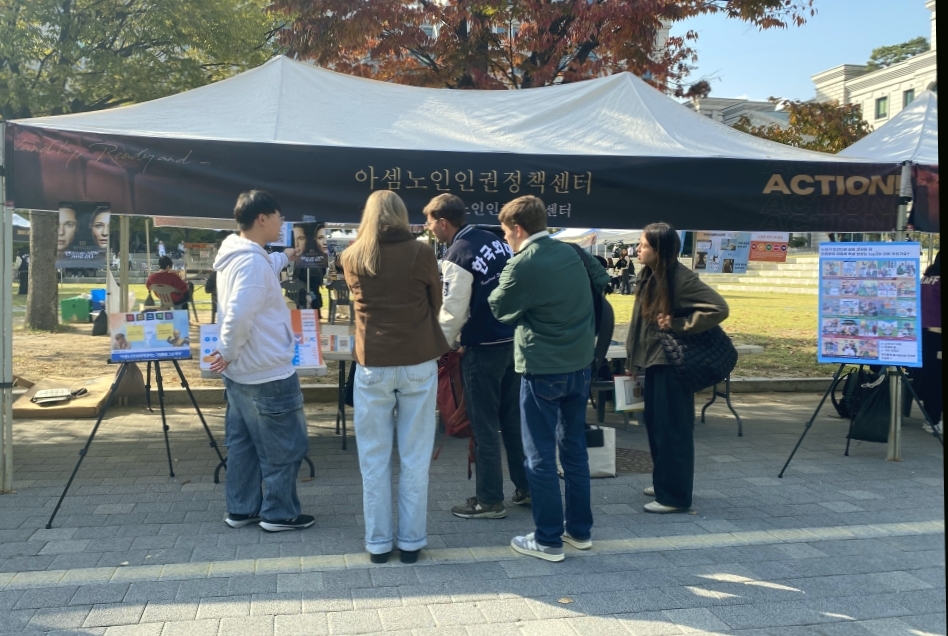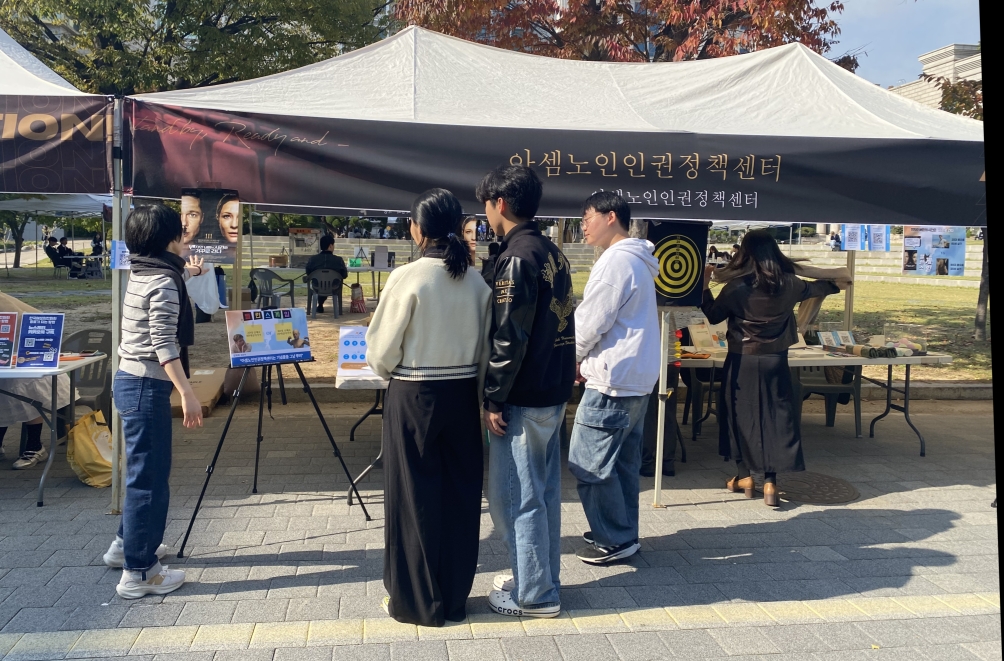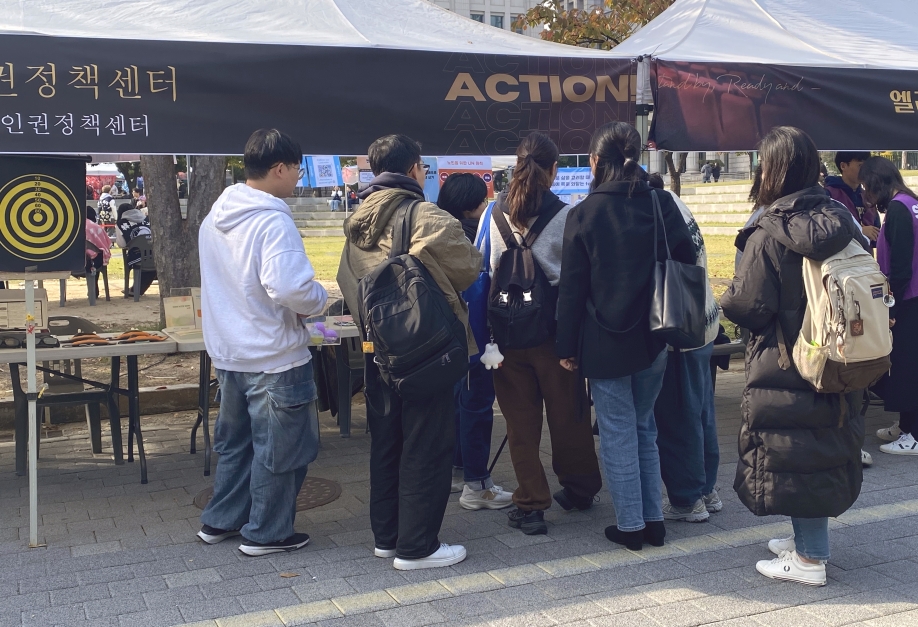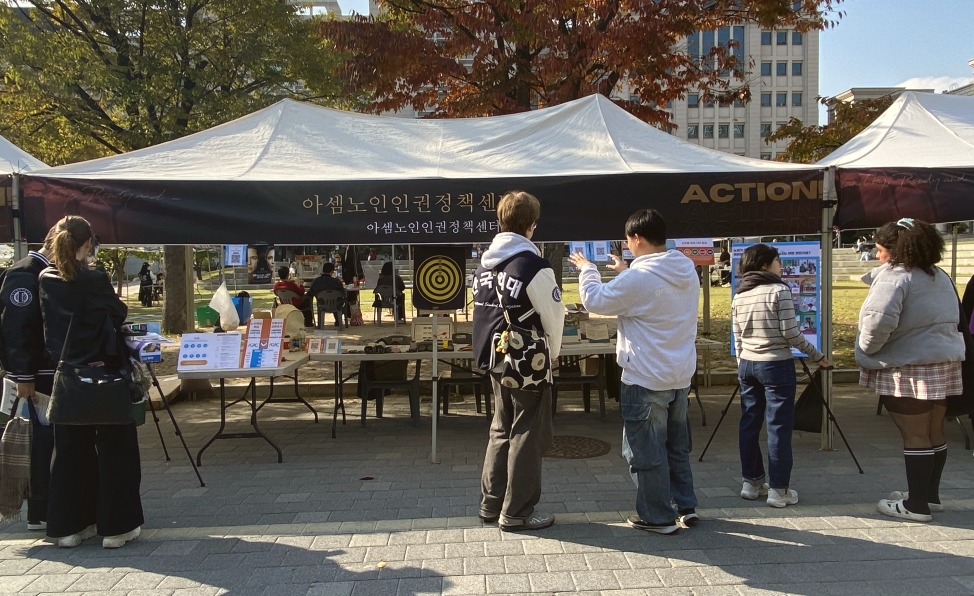AGAC Hosts Campaign on the Rights of Older Persons at HUFS Rights Week
On October 20, the ASEM Global Ageing Center (AGAC) hosted a promotional booth as part of its participation in the 2025 Rights Week: Action! at Hankuk University of Foreign Studies (HUFS). The event was organized by the Human Rights and Solidarity Division of the university’s 59th General Student Council. HUFS Rights Week is an annual campus-wide initiative that promotes human rights, dignity, and social justice.
AGAC’s activities attracted strong interest from student participants and achieved the core objectives of its presence at Rights Week—namely, to foster intergenerational empathy and raise awareness about the dignity and rights of older persons. Approximately 100 students visited the booth throughout the day and actively engaged in the various programs on offer.
The Rights Week program was led and designed by AGAC interns Su-min, Yoon and Seung-kyu, Lee with the aim of enhancing youth awareness and sensitivity toward the human rights of older persons (HROP). On the day of the event, the entire AGAC team joined in to support booth operations.
Interactive Experiences that Resonated with Younger Generations
Robust Student Engagement in the Ageing Experience Activity
One of AGAC’s activities was inspired by The Curious Case of Benjamin Button, a film exploring reverse ageing. Participants were invited to try on AGAC’s old-age simulation kits—such as weighted gloves and special glasses that mimic age-related physical challenges. For instance, students attempted to read both small and large print on a smartphone screen while wearing vision-impairment lenses. Many shared that the experience helped them better understand the everyday struggles faced by older adults.
Gamified Learning to Promote the Human Rights of Older Persons
To add a playful element to the booth, students were invited to engage in a “Would you rather?” game—such as choosing between living with an 80-year-old body at age 20 or the other way around, a nod to the film’s premise. They were then offered Rights Week reward stickers and asked to vote on what they believed to be the most important right of older persons, from among those categorized under the UN’s five core principles: independence, participation, care, self-fulfillment, and dignity.
Self-Reflecting on Ageism: WHO’s Ageism Scale Survey (2025)
The WHO Ageism Scale survey was offered in both Korean and English, allowing students to reflect on their own perceptions of ageing and older persons. A total of 35 students participated in the online survey via QR code and responded to questions that assessed their attitudes toward age-related stereotypes and discrimination.
Youth Prioritize Access to Health Care in Old Age
A total of 65 students participated in a sticker-voting activity to select which of the UN’s detailed rights for older persons—specifically those within the rights assurance category—they considered most important. In total, 195 votes were cast, and the top responses were as follows:
- Access to health Care (31 votes)
- Accessible housing (24 votes)
- Adequate food and clean water (23 votes)
- Self-determination in facility settings (10 votes)
These results indicate that students placed the highest value on rights directly related to survival, safety, and health. In contrast, rights concerning older persons’ social participation, such as engagement in policymaking or community service drew relatively less attention.
Young Eyes on the Human Rights of Older Persons: Toward Intergenerational Empathy
The team described the event as a valuable opportunity for youth to gain first-hand insight into the everyday challenges faced by older adults and to critically reflect on their rights. Inspired by the experience, AGAC hopes to build on this momentum and continue developing engaging activities that foster youth involvement in the human rights of older persons.
Students responded positively, with many saying the experience prompted them to reconsider how older persons are perceived and treated in society. Several noted, “It was an awakening to be reminded that older persons deserve to be respected as equal members of our society.”



